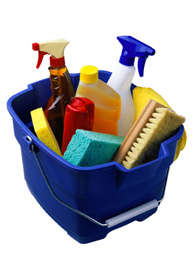 The paper I quoted in my first piece about antibacterial household products was quite old. It did, I believe explain the risks behind these products quite well, so, what is the more recent research and opinion telling us?
The paper I quoted in my first piece about antibacterial household products was quite old. It did, I believe explain the risks behind these products quite well, so, what is the more recent research and opinion telling us?The main antibacterial agent used in soaps and cleaning products is triclosan. It acts in a similar fashion to many systemic antibiotics and may have other mechanisms that can confer resistance to antibiotics.
Use of products containing triclosan may create an environment containing a low level of antibiotic, not enough to kill bacteria, but an ideal place bacteria do develop resistance.
Therefore, if you get an infection from your supposedly clean kitchen counter, the antibiotics the doctor prescribes will have no effect.
I must point out that this has not been conclusively proven. Some studies have found MRSA resistant bacteria on the hand dispensers of antibacterial soap, while another study found no increase in antibiotic resistant bacteria in households using antibacterial products.
However, there is enough concern for calls to ban triclosan use in household products. Last year (2009) the Canadian Medical Association asked the Canadian government for a ban and its safety is currently under review by the FDA.
So, even if it hasn't been proved to be dangerous just yet, is it a risk you want to take in your own home?

References:
Management of Antimicrobials in Infectious 377
Diseases, 2010, Part 3, 377-386, DOI: 10.1007/978-1-60327-239-1_20
Diseases, 2010, Part 3, 377-386, DOI: 10.1007/978-1-60327-239-1_20
No comments:
Post a Comment